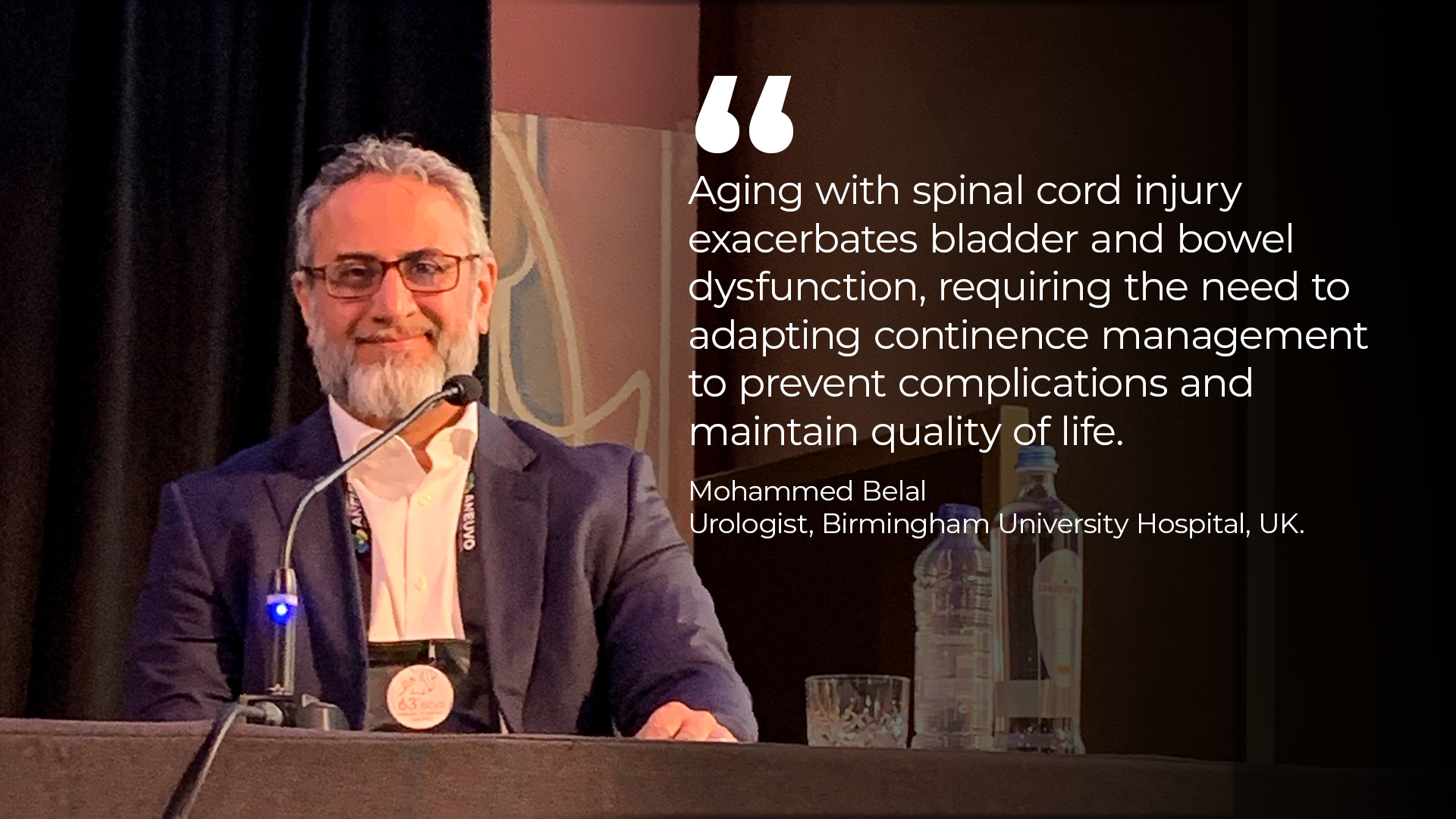
This article explores how the aging process affects bladder and bowel function in SCI patients and discusses the need for specialized management strategies.

Mo Belal, Consultant Urological Surgeon, University Hospitals, Birmingham. Wellspect Symposium, ISCoS International Conference, Antwerp, October 2024
As life expectancy increases, there is a growing population of aging individuals with spinal cord injuries (SCI). Aging exacerbates many of the challenges faced by SCI patients, particularly when it comes to bladder and bowel management.
Overview of Spinal Cord Injury (SCI)
Spinal cord injury is a life-altering condition that can result in varying levels of paralysis and loss of function below the site of injury. The impact on daily life can be significant, especially for those who experience long-term disability. As these individuals age, the effects of SCI on bladder and bowel function become more pronounced, leading to complex care needs.
Common Complications in SCI Patients
Aging can cause several physiological changes that can negatively impact the function of various organs and systems. SCI patients, already affected by injury, may experience further complications related to bladder and bowel function. Understanding these complications is critical to providing appropriate care and ensuring quality of life as SCI patients grow older.
Physiological Changes with Aging
As individuals age, several physiological changes occur that impact both bladder and bowel function:
- Decreased Muscle Strength and Tone: Aging causes a natural decline in muscle strength, which affects the ability to manage bladder and bowel control.
- Slowed Nerve Conduction and Reflexes: The speed of nerve signal transmission diminishes, which can worsen pre-existing neurological impairments in SCI patients.
- Reduced Organ Elasticity and Function: Organs like the bladder and bowel become less flexible and efficient with age, complicating the management of neurogenic bladder and bowel issues.
For SCI patients, aging exacerbates pre-existing impairments and increases the risk of secondary complications, such as urinary tract infections (UTIs), renal failure, and bowel impaction.
Bladder Function in Aging SCI Patients
One of the most common issues faced by aging SCI patients is neurogenic bladder, which leads to problems such as urinary retention, incontinence, and frequent UTIs. As patients age, bladder-related changes include:
- Decreased Bladder Capacity and Elasticity: The bladder's ability to hold urine reduces, increasing the likelihood of urinary retention and overactive bladder.
- Increased Risk of Urinary Retention and Benign Prostatic Hyperplasia (BPH): Aging can exacerbate conditions like BPH, which further impairs bladder function.
- Higher Incidence of UTIs and Kidney Damage: Reduced bladder control and incomplete emptying increase the risk of UTIs, which can lead to kidney damage if not properly managed.
Changes in Bladder Management Over Time
A study on bladder management after SCI in the United States (Cameron et al., 2010) revealed significant changes over time. The study followed 12,984 SCI patients for 5–30 years and found:
- Decline in Intermittent Catheterization (IC): Only 20% of those who initially used intermittent catheterization continued to do so after 30 years.
- Shift Toward Indwelling Catheters: There was a notable increase in the use of indwelling catheters, and many patients switched from intermittent catheters to suprapubic catheters (SPC) or urostomies.
These findings highlight the evolving nature of bladder care as SCI patients age, with a tendency toward more invasive forms of management.
Bowel Function in Aging SCI Patients
Aging also affects neurogenic bowel, leading to common issues such as constipation, fecal incontinence, and irregular bowel movements. The aging process impacts bowel function in several ways:
- Slower Gastrointestinal Motility: As the digestive system slows down, constipation becomes more prevalent.
- Decreased Physical Dexterity: Aging can reduce the ability to manage bowel programs, making regular bowel routines more challenging.
In long-term studies, it was found that 42% of SCI patients over 20 years post-injury had difficulty managing constipation, and 27% reported fecal incontinence (Menter et al., 1997). Constipation was more common in paraplegic patients, while fecal incontinence and diarrhea were more prevalent in tetraplegic patients.
Consequences of Aging on Bladder and Bowel Management
As SCI patients age, several complications related to bladder and bowel function become more common:
Increased Complications:
- Higher Risk of Incontinence: Aging leads to an increased likelihood of urinary and fecal incontinence, which can affect both bladder and bowel control.
- Greater Risk of UTIs, Renal Complications, and Bowel Impaction: These complications are more likely as bladder and bowel management becomes more difficult with age.
Impact on Quality of Life:
- Emotional and Psychological Burden: Ongoing bladder and bowel issues can lead to feelings of frustration, isolation, and depression.
- Increased Dependency: As bladder and bowel care becomes more complex, SCI patients may require more assistance from caregivers, reducing their independence.
Healthcare Utilization:
- Increased Medical Interventions: Aging SCI patients often require more frequent medical interventions, hospitalizations, and treatments for complications such as UTIs and bowel blockages.
- Higher Healthcare Costs: Managing these complications leads to greater healthcare costs, both for patients and the healthcare system.
Management Strategies for Aging SCI Patients
Effective management of bladder and bowel issues in aging SCI patients requires a tailored approach. Here are some strategies:
Bladder Management:
- Regular Monitoring: Urodynamic studies and regular follow-ups can help identify changes in bladder function over time.
- Catheterization Options: Depending on the patient’s needs, intermittent catheterization (IC) or indwelling catheters may be used.
- Medications: Anticholinergics, alpha-blockers, and beta-3 agonists can help manage bladder function.
- Surgical Interventions: Procedures such as botox injections or bladder augmentation may be needed to improve bladder capacity and function.
Bowel Management:
- Scheduled Bowel Programs: Regular bowel routines help manage constipation and incontinence.
- Medications: Stool softeners, laxatives, and suppositories can help regulate bowel movements.
- Dietary Modifications: A high-fiber diet and increased fluid intake are key to preventing constipation.
- Bowel Irrigation Systems: Some patients benefit from bowel irrigation systems to help evacuate stool effectively.
- Stoma: In certain cases, a stoma may be necessary to manage bowel function.
Multidisciplinary Approach:
A team-based approach is essential in managing the complex needs of aging SCI patients. This includes:
- Urologists, gastroenterologists, and nurses to oversee medical care.
- Physiotherapists and occupational therapists to enhance physical function and independence.
- Rehabilitation specialists play a key role in optimizing functional abilities.
- Psychological support for both patients and caregivers to address emotional and mental health challenges.
Conclusion
The aging process significantly complicates the management of bladder and bowel function in SCI patients. The physiological changes associated with aging, combined with the impact of SCI, increase the risk of complications and reduce patients' quality of life. Proactive, multidisciplinary care is essential to address these challenges and ensure that aging SCI patients can maintain independence and well-being. Continuous evaluation and adaptation of care plans are critical to managing these patients effectively as they age.
By understanding the unique needs of aging SCI patients, healthcare providers can improve outcomes and enhance the quality of life for this growing population.